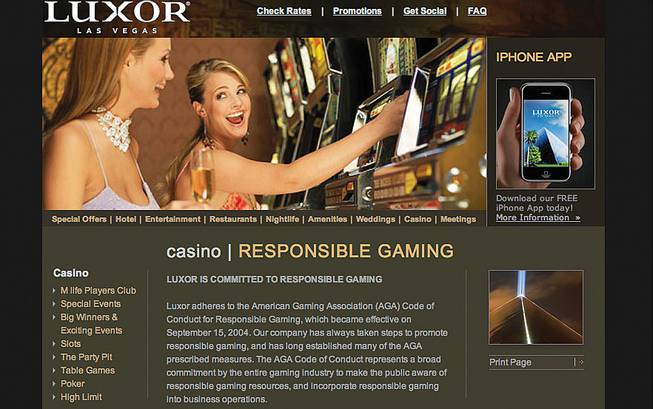
The responsible gaming page on the Luxor website.
Monday, April 25, 2011 | 2 a.m.
A few years ago during Responsible Gaming Education Week, every MGM Resorts employee was required to wear an orange wristband that read: “Keep It Fun.” At lunch with an MGM executive that week, I needled him about how ridiculous the gesture was, only to have him scold my skepticism. Plastic jewelry, he insisted, was important to raising awareness of problem gambling, and the company seriously wants to help problem gamblers.
That encounter sprang to mind this month after I strayed accidentally into the “responsible gaming” section of the Monte Carlo website, was quite appalled, and then took an extensive and damning inventory of how major casinos handle this matter online. Then, I watched with sadness as some of the Strip’s mouthpieces went into damage-control mode rather than soul-searching mode upon the April 14 release of a credible $3 million study that found gambling addiction is twice as common as alcoholism.
This is an era in which gambling — casino or otherwise — has never been easier. The shutdown in recent days in the U.S. of the world’s biggest poker websites amid a federal indictment will make playing online temporarily more challenging, but there’s also legislation in Carson City to allow mobile gaming devices to be taken to private places such as hotel rooms. So I find the industry’s sincerity questionable. They point to the “When the Fun Stops” brochures near the ATMs and the dough they give Harvard for addiction research, but for proof to how serious they are, consider what I found online:
• Click on the “responsible gaming” (RG) tab for Monte Carlo and you’re greeted with a headline that reads, “HIT THE CASINO.” There’s also a sexy video of hot babes winning at craps. Beneath all that is a copy block emphasizing how fantastic MGM Resorts is for training employees to spot problem gambling. Near the end is a hotline number.
• The “responsible gaming” sections of the Luxor and Mandalay Bay show hot blondes having fun.
• The Excalibur, Tropicana and Stratosphere’s “responsible gaming” sites show images of jackpot-hitting slots, a roulette ball landing on green, card players peeking at great hands. All Caesars Entertainment resorts feed to the same page showing, among other things, a royal flush.
• Both Caesars and Boyd Gaming force you to find their responsible gaming links in tiny print at the very bottom of each resort’s websites.
Theoretically, this material is on these sites so someone who thinks they’re an addict — or even someone who never thought of it before — can get help. Instead, in almost every case, the badly written information is surrounded by distraction and titillation, with links to the rest of the casino’s offerings. Would a site for potential alcoholics sport images of happy, sexy drinkers and links to the nearest saloon? Would a site on compulsive eating disorders boast pictures of hot fudge sundaes and jelly beans?
Only one company, in my judgment, does it right, and it surprised me: Las Vegas Sands. CEO Sheldon Adelson once told me gambling addiction doesn’t exist in Asia, but nonetheless each of the Las Vegas Sands sites links to a totally separate responsible gaming page where the hotline number stares you in the face. No alluring links compete for your attention; there’s a left rail providing several ways to find help and information. And the image atop the page is that of a despondent fellow in front of a blur of slot machines. You don’t want to be that guy.
It’s not that I hold casino owners responsible for eradicating compulsive gambling, but they’re out there tooting their horns about how terrific they are. Rather than patting themselves on the back for mandating wristbands one week a year, Strip resorts can actually make a difference by making the information they provide online easy to find, straightforward and devoid of both temptation and self-congratulations.
That’s when we’ll know they’re serious.
Oh, and by the way, the National Council on Problem Gambling’s hotline is 1-800-522-4700. Good luck. Sort of.
Steve Friess’ column first appeared in this week’s issue of Las Vegas Weekly, a sister publication of the Sun.

Join the Discussion:
Check this out for a full explanation of our conversion to the LiveFyre commenting system and instructions on how to sign up for an account.
Full comments policy